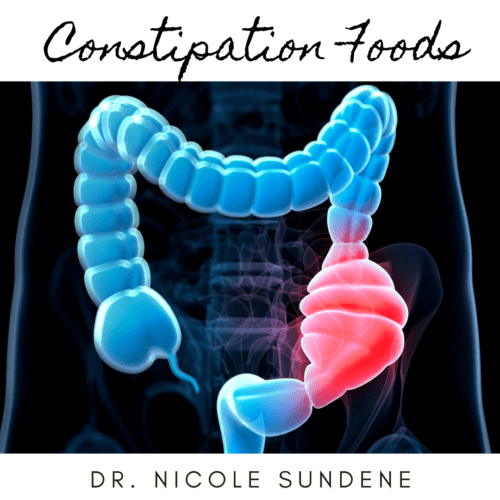
Dr. Nicole Sundene, NMD
Scottsdale Naturopathic Doctor
Bloating and constipation in women can be hormonally triggered with PMS each month. Or very commonly can be caused by low stomach acid. I will share my stomach acid test today so you can do this and know if you just need to supplement with HCL or hydrochloric acid.
Bloating in women that does not change or go away should be addressed by a doctor as on rare occasions bloating can be a symptom of Ovarian Cancer, and therefore we should not ignore this symptom in women's health. First, run a simple stomach acid test, if your stomach acid is not low and therefore causing bloating, you should see your Naturopathic Doctor to determine the Root Cause.
To test if you are deficient in stomach acid try this:
STOMACH ACID TEST:
1tsp Baking Soda
2-4 oz Water
Mix together and drink.
Results:
If you burp in 2 minutes you have sufficient stomach acid.
If you burp in under 5 minutes you have low stomach acid.
If you don't burp at all or only have a tiny burp, then you are very low in stomach acid and need to supplement as we will discuss today.
I will also review the hormonal causes of bloating and constipation in women.
Bloating can occur with PMS and Perimenopausal Hormone Imbalance.
Constipation is a frustrating Women's Health condition that can be related to hypothyroidism, PMS, hormone imbalance, diet, stress, and anxiety from a Naturopathic perspective. The best Naturopathic Doctor will work to understand the ROOT CAUSE of constipation from a Mind/Body/Spirit perspective.
While many women are simply under too much emotional stress or "Fight, Flight, Fright" or in too much of a hurry to relax and eliminate their bowels the #1 Hormone Imbalance symptom related to constipation is hypothyroidism. Hashimoto's Thyroiditis will especially cause constipation when the patient is in a low thyroid state and diarrhea when in an Autoimmune thyroid storm. Chronic constipation and straining can cause hemorrhoids.
Constipation refers to the incomplete (small stools) or infrequent (fecal mass remains in colon longer than the normal 24-72 hours after meal ingestion) passage of stools, as well as difficulty passing stools.
The condition can be acute or chronic.
Small rabbit pellet shaped stool is a hallmark symptom of magnesium deficiency and lack of fiber.
Lack of hydration also commonly causes constipation.
Most people experience constipation from time to time, but usually lifestyle changes and improved dietary habits can help relieve the symptoms and prevent recurrences.
There is no standard for frequency of bowel movements, but most physicians recommend 1-2 bowel movements daily (based upon the frequency that is generally observed among healthy people who eat a high-fiber diet).
In nature, animals defecate every time after they eat, so stress, school and being in a work environment can commonly cause women to help their stool in. While we are working to discover the root cause the simplest treatment is to take magneisum oxide (not citrate which is the good magnesium I discuss in my "Magnesium Deficiency" blog) as this poorly absorbed form actually draws more water in to the colon to work as a natural stool softener.
I also recommend that women struggling with constipation drink strong coffee in the morning and not black tea which is constipating. Avoid cooked carrots and cooked vegetables and instead opt for more fresh raw vegetables and fresh fruit.
There are four categories of constipation
Functional constipation: Caused by insufficient dietary fiber and water, inadequate exercise, etc.
Neurogenic or “spastic” constipation: Increased narrowing of the colon with small, ribbon-like stools caused or exacerbated by obstruction, stress, nervousness or anxiety (as in cases of cold, pain, grief, fear, etc.)
Constipation can also result from a repeated voluntary resistance of the urge to move the bowels, such as children holding their stool at school or women holding it at work. There may be some food allergies, as to milk or wheat, associated with this type of constipation. Drugs, stress, and certain medical conditions can also decrease the natural peristaltic motion of the gut smooth muscle and increase the tendency for constipation. Low back pain, exacerbated by straining, may contribute.
Atonic constipation (“lazy bowel”): This is a muscular weakness in the rectum and sigmoid colon, caused most often by laxative abuse. Other medical conditions such as hypothyroidism, Hashimoto's, pregnancy, emphysema, and electrolyte imbalances (in the blood that supplies the muscles of the rectum) may also result in this type of constipation. Calcium carbonate use as I discuss in my "Osteoporosis" blog also can cause constipation.
Mechanical or “obstructive” constipation: Can be caused by fecal impaction, SIBO, candida overgrowth, lesions that obstruct the bowel (tumor, pregnant uterus, fibroids, ovarian cysts, endometirosis), inflammation (irritable bowel disease) or spasm from pain in the colon, rectum or anus.
Constipation can give rise to many different ailments, including appendicitis, halitosis (bad breath), body odor, coated tongue, depression, diverticulitis, chronic fatigue, gas, headaches, hemorrhoids, hernia, indigestion, insomnia, malabsorption, obesity, varicose veins, and the development of intestinal cancer.
Regular bowel movements are important in the body’s detoxification process, as the colon serves as a holding tank for waste matter. Antigens and toxins from an unbalanced gut flora population may play a role in the development of many types of chronic disease.
Note: Your naturopathic treatment for constipation will vary according to the type of constipation you have. The dietary recommendations and guidelines below contain foods to which some individuals may have allergies, intolerances and sensitivities.
In those cases, those foods should be avoided. Dietary choices should be modified to meet your personal dietary needs. Consult your Naturopathic Doctor for further information regarding nutrition and your individual medical condition.
Dietary Recommendations and Considerations
In general, eat a high-fiber whole foods diet that includes vegetables, fruits, whole grains, legumes, nuts and seeds. The most efficient colon movers contain a combination of soluble and insoluble fiber. Soluble fiber dissolves in water, forming a gel that coats the intestinal wall. Insoluble fiber does not dissolve in water, but rather soaks water up like a sponge as it passes through the intestine, helping to prevent constipation.
Foods highest in soluble fiber include adzuki beans, barley, dried beans and peas, beets, cabbage, carrots, oats, okra and some fruits, especially apples, apricots, bananas, blackberries, blueberries, citrus, cranberries, figs, grapes, melons, peaches, pears and prunes. Psyllium, slippery elm (Ulmus Fulva) and marshmallow (Althaea Officinalis) are also high in soluble fiber.
Foods highest in insoluble fiber include cereals and whole grains, seeds (like ground flax, soaked chia seeds, or psyllium seed powder), and the skins or peels of many fruits and vegetables.
Avoid dairy products, soft drinks, meat, refined carbohydrates, sugar and processed foods, salt, alcohol and coffee.
Drink more water. This is particularly more important when adding more fiber to your diet. Drink at least 64 ounces daily. Rule-of-thumb for water consumption: one third of your body weight in ounces plus 8 ounces for each cup of coffee or tea (diuretics), plus 8 ounces for each one half hour of exercise daily.
Many women are always nervous or even scared to tell me about their constipation or IBS: Irritable Bowel Syndrome symptoms. Please read my article about "Why I Became a Naturopathic Doctor," so you feel reassured that you can safely discuss these important symptoms that we should not be ignoring.
Think of your Women's Health Doctor as a car mechanic for women. We are here to help you fix your problems and feel optimal! If you need my help with your constipation, or think it is related to Hormone Imbalance, simply pop over to my SCHEDULE page to treat yourself to a Naturopathic visit!
Dr. Nicole Sundene
(480) 837-0900
Dr. Sundene is a Naturopathic Doctor in Scottsdale, Arizona, and is a Female Hormone Expert in Women's Health and Bioidentical Hormones. She specializes in Holistic Women's Health for Menopause, Thyroid, Hashimotos, PMS, Perimenopause, Autoimmune, Postpartum, Chronic Fatigue, Depression, Anxiety, Food Allergies, Digestion, Dermatology, Acne, Psoriasis, Eczema, and Adrenal Hormonal Conditions. In 1999 she began working for a Hormone Doctor prior to starting Naturopathic Medical School. With over 23 years of experience in both Prescription and Natural women's health and hormones, she presents to women the best-integrated health solutions for their Chronic Disease. She has been an Herbalist for over 28 years and enjoys teaching women how to use herbs to balance their hormones, nutrition and optimize their health. Dr. Sundene relies on blood testing for her hormone metrics. The hormone testing is covered per the patient's insurance plan (not Medicaid) and conducted at certain points in the woman's menstrual cycle. To learn more about Hormone Testing for Women Visit: Bioidentical Hormones. Follow Dr. Sundene on Instagram, Twitter, and Facebook for more tips on Women's Health, Female Hormones, and Naturopathy!
References:
Balch, Phyllis and James. Prescriptions for Nutritional Healing, 3rd edition. 2000. Avery.
Barber, Mary C. and Whiteford, Sara C. Super Smoothies. 2000. Chronicle Books.
Escott-Stump, Sylvia. Nutrition and Diagnosis-Related Care, 4th edition. 1998. Williams and Wilkins.
McIntyre, Anne. Drink To Your Health: Delicious Juices, Teas, Soups and Smoothies That Help You Look and Feel Great. 2000. Gaia Books Ltd.


